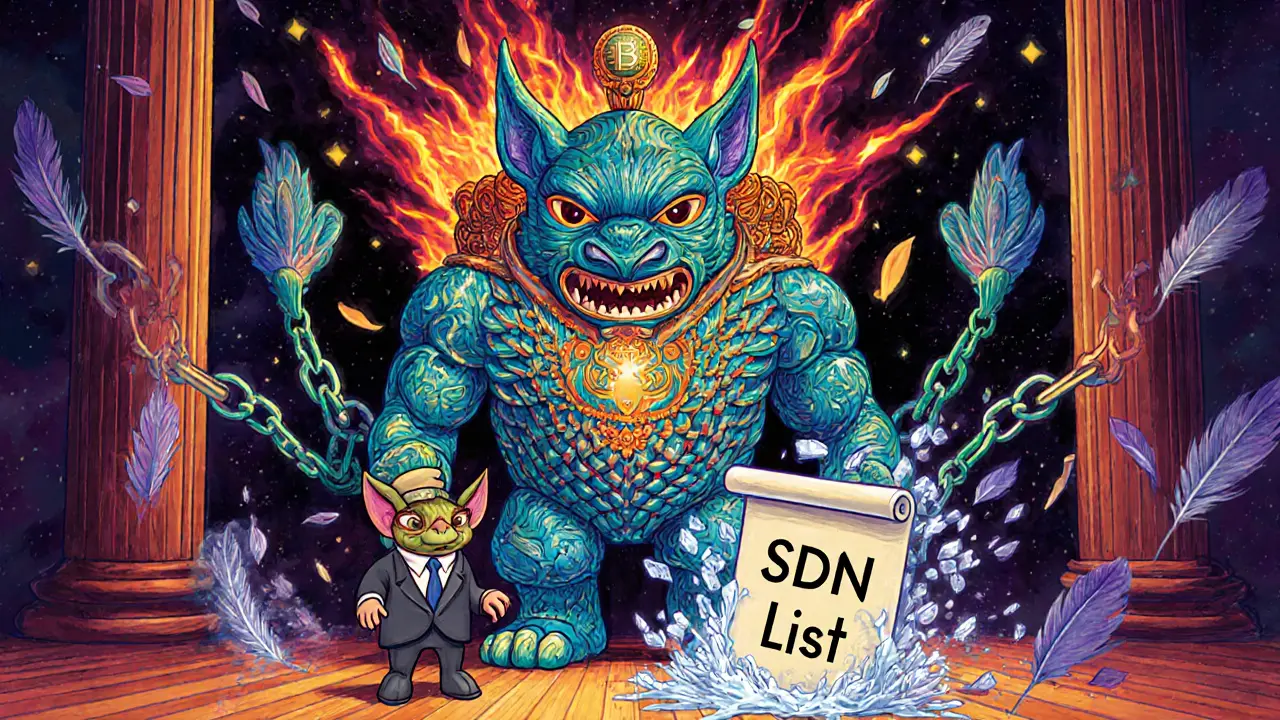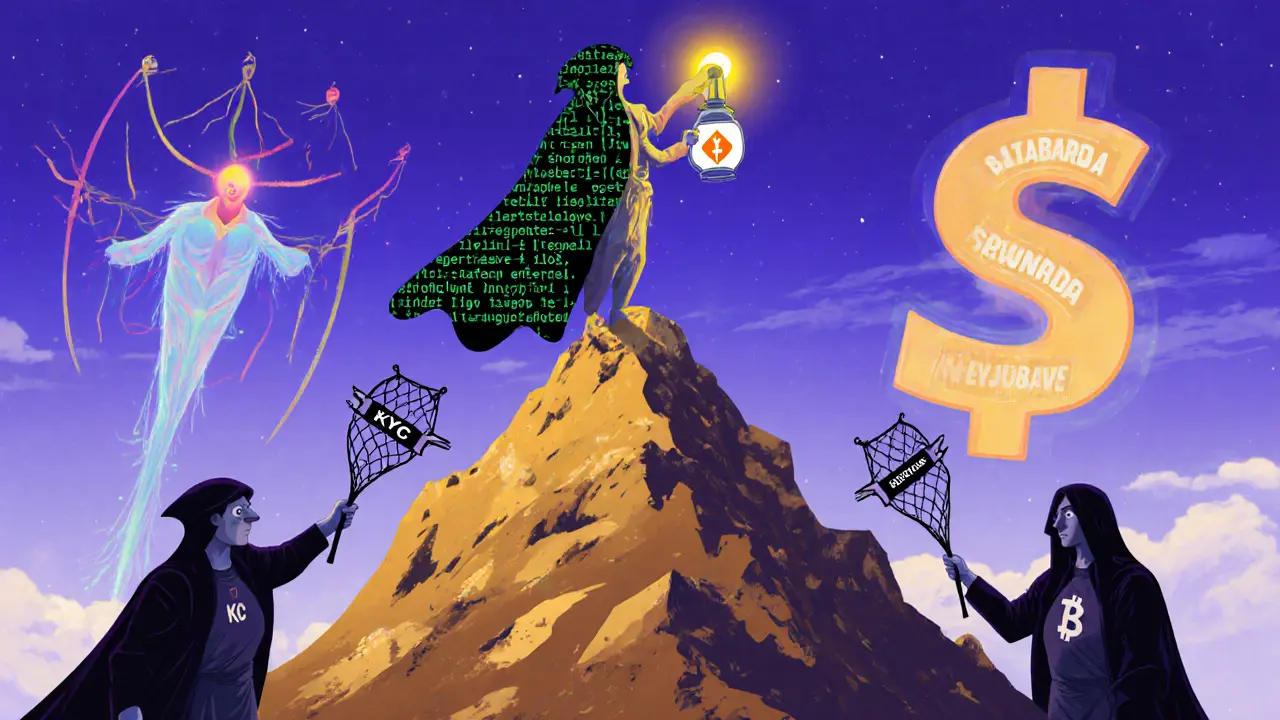Crypto Mixer Legitimacy Calculator
Transaction Analysis
Based on U.S. Treasury and Chainalysis data, approximately 30% of transactions through Tornado Cash were linked to illicit activity. This calculator estimates the proportion of legitimate vs. potentially illicit transactions.
Results
$7.6B total transactions | 30% linked to illicit activity (per 2022 Chainalysis report)
Before Tornado Cash was sanctioned, it was one of the most used tools in crypto for keeping transactions private. People didn’t use it to hide stolen money-they used it because they didn’t want their financial history tracked by anyone, including governments or corporations. But when the U.S. government slapped sanctions on it in 2022, everything changed. What followed wasn’t just a crackdown-it was a legal earthquake that’s still shaking how regulators think about blockchain technology today.
What Is a Crypto Mixer?
A crypto mixer, sometimes called a tumbler, is a tool that breaks the link between the sender and receiver of a cryptocurrency transaction. Think of it like shuffling a deck of cards. You put your cards in, and when they come out, you can’t tell which card was yours. That’s exactly what a mixer does with crypto. You send ETH or BTC to a mixer, it combines your coins with others’, and then sends you back a different amount from a different address. No one looking at the blockchain can trace your original transaction.
This isn’t inherently illegal. Privacy is a basic right in financial systems. Banks in the U.S. don’t publish your transaction history for anyone to see. Crypto, by design, is public. Every transaction is recorded on a permanent, global ledger. That’s great for security, but terrible for privacy. Mixers give users control over who can see what they’re doing. Many legitimate users-activists, journalists, people in authoritarian countries-rely on them.
What Was Tornado Cash?
Tornado Cash was the most popular mixer on Ethereum. Launched in 2019, it ran entirely on smart contracts-self-executing code on the blockchain. No company owned it. No server hosted it. No person controlled it after launch. That’s what made it unique. It didn’t hold your money. It didn’t ask for your ID. It just did its job: mixing ETH and ERC-20 tokens.
By 2022, Tornado Cash had processed over $7.6 billion in transactions. That’s a lot. And yes, some of it came from criminals. The U.S. Treasury said the Lazarus Group, a North Korean hacking team, used it to launder $455 million stolen from Axie Infinity. Other heists linked to it included the Harmony Bridge, Nomad, and BitMart attacks. Altogether, about 30% of the funds flowing through Tornado Cash were tied to illegal activity, according to Chainalysis.
But here’s the problem: the mixer didn’t know who was using it. It didn’t care. It just processed every transaction the same way. That’s the point of privacy tools-they’re neutral. Like a public mailbox or a cash register, they can be used for good or bad. The Treasury didn’t target the hackers. They targeted the tool.
The OFAC Sanction: What Happened in August 2022
On August 8, 2022, the U.S. Department of the Treasury’s Office of Foreign Assets Control (OFAC) added Tornado Cash’s Ethereum addresses to its Specially Designated Nationals (SDN) list. That meant it was now illegal for any U.S. person-or anyone doing business in the U.S.-to interact with those addresses. Even if you didn’t know you were sending money to Tornado Cash, you could be breaking the law.
The move sent shockwaves through the crypto world. Exchanges like Coinbase and Kraken blocked access to Tornado Cash addresses. Wallets like MetaMask started warning users if they tried to send ETH to a sanctioned address. Developers were scared to even look at the code. Some open-source projects removed Tornado Cash references to avoid legal risk.
But here’s the catch: you couldn’t actually shut down Tornado Cash. The smart contracts kept running. People still used them through command-line tools and custom scripts. The website was taken down, but the code was still out there-on GitHub, on mirrors, on the dark web. The sanctions didn’t stop the mixer. They just made it riskier to use.

The Legal Backlash: Van Loon v. Treasury
By late 2023, a group of users and developers filed a lawsuit. Their argument? OFAC had no legal authority to sanction code. Smart contracts aren’t property. They’re not owned by anyone. You can’t seize them. You can’t freeze them. They just exist on the blockchain, running automatically.
In November 2024, the U.S. Fifth Circuit Court of Appeals agreed. In a landmark decision, the court ruled that OFAC had overstepped its authority under the International Emergency Economic Powers Act (IEEPA). The law lets the government block assets and financial interests. But code? That’s not an asset. It’s a set of instructions. The court ordered the Treasury to remove the sanctions from Tornado Cash’s smart contracts.
This wasn’t a small ruling. It was a constitutional-level challenge to how regulators treat decentralized technology. If you can sanction code, what stops them from sanctioning Python? Or HTML? Or the Bitcoin protocol itself?
The Delisting: March 2025 and the Nuanced Twist
On March 21, 2025, the Treasury officially removed Tornado Cash from the SDN list. For the first time since 2022, Americans could legally interact with the smart contracts again. Wallets removed the warnings. Exchanges reopened access.
But there was a twist. The Treasury didn’t remove sanctions from everyone. Developer Roman Semenov was still sanctioned. And the Department of Justice was still prosecuting him-along with another developer, Roman Storm-for money laundering, operating an unlicensed money transmitter, and violating IEEPA.
This was a strategic move. The Treasury was saying: We’re not banning privacy tools. We’re going after the people who build them if they’re helping criminals. It’s a fine line, but it’s a line they’re trying to draw: punish humans, not code.
It’s also a signal to other developers. Build a mixer? Fine. But if you’re actively promoting it to criminals, or if you’re the only one who can update it? You’re at risk.

Why This Matters for Crypto Privacy
The Tornado Cash case set a new precedent. Before this, regulators treated crypto tools like banks-something you could license, monitor, or shut down. Now they know that’s not possible with decentralized protocols. You can’t force a smart contract to comply. You can’t make it KYC users. You can’t demand logs.
That’s why the court’s decision matters. It recognized that blockchain isn’t just a new kind of bank. It’s a new kind of system. One that doesn’t rely on central control. One where the rules are written in code, not contracts.
Privacy advocates celebrated the delisting as a win. But the prosecution of the developers shows the tension isn’t over. The government still wants to stop bad actors. It just can’t do it by banning tools. Now it has to find smarter ways.
What This Means for You
If you’re a regular crypto user: you can use mixers again without breaking U.S. law. But be careful. If you’re sending money to an address that’s been linked to theft, even through a mixer, you might still be flagged. Mixers don’t make you invisible to investigators-they just make it harder.
If you’re a developer: you can build privacy tools. But don’t write marketing materials that say, “Perfect for laundering.” Don’t offer support to known criminals. Don’t keep a backdoor. The line isn’t about the tool-it’s about intent.
If you’re worried about surveillance: this case proves privacy tech can survive government pressure. But it also proves that regulators will keep trying. The battle isn’t over. It’s just getting more sophisticated.
What’s Next?
The DOJ’s criminal case against Roman Storm is still ongoing. If he’s convicted, it will be the first time a developer is jailed for building a privacy tool. That could scare off engineers from working on decentralized projects altogether.
Meanwhile, other mixers are popping up. Tornado Cash’s code is open-source. Anyone can fork it. New versions are already live, with improved interfaces and better privacy features. The genie is out of the bottle.
Regulators are now scrambling to catch up. The SEC and Treasury are drafting new guidance on decentralized finance. The EU is considering similar rules. And the rest of the world is watching. This case will shape crypto regulation for the next decade.
One thing is clear: privacy isn’t going away. And neither is regulation. The question isn’t whether crypto users will have privacy tools. It’s whether governments will learn to live with them-or keep trying to break them.












15 Comments
It’s fascinating how we’ve reached a point where the law struggles to distinguish between a tool and its misuse. A hammer can kill someone, but we don’t ban hammers. We prosecute the person who swings it with malice. Why should code be any different? Privacy isn’t a loophole-it’s a feature of a free society. If we start sanctioning abstract logic, where do we draw the line? Next, they’ll try to outlaw encryption because criminals use it.
THIS IS A SETUP. 🤫 The government didn’t sanction Tornado Cash because of Lazarus-they sanctioned it because they KNOW crypto is the future, and they’re terrified of losing control. They’re not after criminals. They’re after YOU. Every time you use a mixer, you’re fighting the surveillance state. And if you’re not using one? You’re already compromised. 💀
So let me get this straight-we’re supposed to be okay with criminals laundering hundreds of millions through open-source code, but we can’t punish the people who made it? That’s not justice, that’s surrender. If you build a machine that’s used to rob banks, you’re an accessory. Stop pretending this is about ‘free speech.’ This is about accountability. 🇺🇸
Thank you for this exceptionally well-researched and balanced exposition. The legal and ethical dimensions of this case are profoundly important, and I believe the Fifth Circuit’s ruling represents a crucial reaffirmation of the principle that code, in and of itself, is not an entity capable of intent or culpability. The distinction between tool and actor is not merely semantic-it is foundational to the rule of law. To conflate the two risks eroding the very constitutional safeguards we claim to uphold.
OH MY GOD I JUST REALIZED THIS IS LIKE THE INTERNET’S VERSION OF THE PROHIBITION ERA 😭😭😭 They banned alcohol, so people made bathtub gin, and then they blamed the bathtub. Now they’re banning crypto mixers, and they’re blaming the blockchain. But guess what? People still want privacy. They always will. And now? The government’s trying to arrest the guy who wrote the recipe. 🤯 This isn’t about crime-it’s about control. And if you think this ends with Tornado Cash, you’re dreaming. Next up: banning open-source libraries because someone used them to build a bot that spams TikTok. 🙃
i just read this and my brain hurt 😭 like… if you cant sanction code then why is github still removing stuff? and why did meta mask block it? and why do i still get warnings? im confused. like… is it legal or not? the law is so messy. i just wanna send eth without someone tracking my rent payments lol
This is a textbook case of regulatory arbitrage failure. The IEEPA was never designed for decentralized, permissionless infrastructure. You can’t apply KYC/AML frameworks to trustless protocols-your compliance model is architected for intermediaries, not autonomous agents. The real issue? Legacy institutions are trying to force Web3 into a 20th-century regulatory mold. We need a new paradigm: risk-based, outcome-oriented, not tool-based sanctions.
lol imagine being scared of a smart contract 😂 i mean, it’s just code sitting on a bunch of computers. the fact that the gov spent millions on this and still couldn’t shut it down is kinda funny. also, roman semenov’s lawyer probably made bank. 🤑
Wow, this is such a beautiful breakdown 🌸 I’m from India, and here, people use crypto to send money home without paying crazy fees or waiting weeks-privacy isn’t about crime, it’s about dignity. I’m so glad the court saw that. But I’m also scared for devs… if building tools makes you a target, who’s left to build? 🫂
This is exactly why we need better education-not more bans. The public doesn’t understand how blockchain works, so they panic when they hear ‘money laundering.’ But the solution isn’t to silence privacy-it’s to empower users with knowledge. Tools like Tornado Cash aren’t the enemy. Ignorance is.
I’m so proud of the court’s decision!! 🥹 This is what freedom looks like. Yes, bad things happen-but we don’t burn down libraries because someone stole a book. We catch the thief. And honestly? If you’re using crypto, you’re already part of the future. Let’s keep building, not banning. 💪✨
So we’re supposed to applaud this? A tool that laundered half a billion dollars is now legally usable again? And the developers who enabled it are the only ones punished? This isn’t justice. It’s a symbolic gesture that does nothing to deter crime. The system is broken.
What’s really happening here is a clash between two worldviews: one that sees technology as a mirror of human intent, and one that sees it as a force beyond human control. Tornado Cash was neither good nor evil-it was neutral. The real question isn’t whether we should ban it. It’s whether we’re willing to live in a world where people can be punished for creating neutrality.
Wow. Just… wow. The fact that people still think this is okay is why civilization is collapsing. You don’t get to hide behind ‘privacy’ while funding terrorists. This isn’t crypto. It’s chaos with a whitepaper.
The deeper lesson here isn’t about mixers or sanctions-it’s about the nature of authority in a decentralized world. Governments are used to controlling nodes: banks, exchanges, ISPs. But blockchain has no central node. The law is trying to regulate a network that has no address, no CEO, no headquarters. That’s not a loophole. That’s evolution. And evolution doesn’t ask for permission.